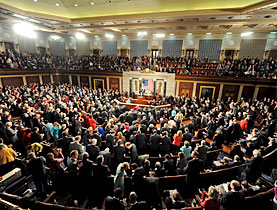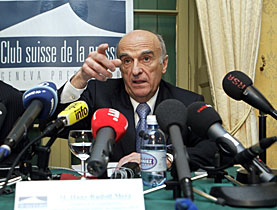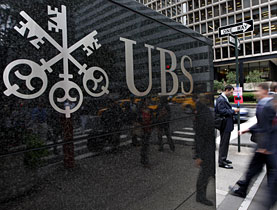Secret banking wins libertarian friends in US

In its defence of banking secrecy, Switzerland has allies in the United States. That's the good news; the bad is that if they're not outmatched, they're outnumbered.
They are two of the US’s abating breeds – civil libertarians and fiscal conservatives – and inasmuch as President Barack Obama has taken a more conciliatory foreign policy than his predecessor, the niceties have not trickled down to tax evaders and their enablers.
That’s an unlucky development for Switzerland but not much of a surprise. Obama said on May 4: “We shouldn’t let some citizens dodge their [tax] responsibilities while ordinary Americans pick up the slack. Unfortunately, that’s exactly what we’re doing.”
Swiss officials will meet on June 16 with their US counterparts in Washington in an attempt to hammer out a new double taxation agreement.
Tax havens are good fodder for US political theatre: the liberals need money, some conservatives lay the blame on high taxes, and libertarians are crying foul.
The Swiss have said in the past that existing taxation laws are good enough.
Dan Mitchell, a senior fellow at the Cato Institute, a libertarian think tank, fears his government is overreaching.
“There has been a steady erosion of the Fourth Amendment,” he told swissinfo.ch, referring to the portion of the US Bill of Rights guarding against unreasonable searches and seizures. Mitchell says the US has no business policing the activities of its citizens outside its own borders.
Aligning with Europe
The Obama administration is more closely aligning the US with what Europe’s big economies have been doing for years: clamping down on tax-friendly jurisdictions.
But the US began ratcheting up the pressure even before Obama took office. Investigations into the business practices of UBS, Switzerland’s largest bank, began in 2008, and a year earlier, Michigan Democrat Carl Levin introduced the Stop Tax Havens Abuse Act – with the support of then-Senator Obama.
Levin has since tabled a reincarnation that’s 15 pages longer. His office did not make the senator available for an interview.
John Campbell, a Republican congressman and member of the House Committee on Financial Services, says Obama’s stance on Swiss banking is at odds with his pledges to demonstrate greater respect for other countries.
“I think it’s difficult to say you’re going to have that kind of viewpoint internationally and then selectively pick out Swiss banking as something you’re going to treat differently,” he said.
“My position is generally that there are Swiss banking laws and beyond that there’s almost an ethos or a history around Swiss banking, where the privacy aspect has been a critical aspect for literally hundred of years,” Campbell added.
Taxes and nativism
The California congressman is one of a dozen or so who “get it” on taxes, according to Ryan Ellis, tax policy director at Americans for Tax Reform, the fiscally conservative pressure group founded in 1985 by influential Republican lobbyist Grover Norquist at the request of Ronald Reagan.
Ellis is less a defender of Switzerland than a man who wants lower taxes. He lays the blame in part on growing insular sentiments, particularly among constituencies that Americans for Tax Reform might have been able to count on two decades ago.
“We view this as a tax fight but there’s also an increasing nativism going on in the Republican Party,” he said. “And the reason the Democrats are going after this as a pressure point is because they think, correctly, that they can exploit a lot of the nativism.”
“They’re looking at the effects and not the cause… Why do people want to do this stuff? And it always comes down to marginal tax rates,” Ellis said.
Policy works
“It’s not the fault of small countries that have sound fiscal regimes and reasonable marginal tax rates that the United States corporate rate has crept up to the second-highest in the world,” Ellis added.
He believes that if rates were lower, the decreased savings would dissuade many people from breaking the law. “It’s not an all-or-nothing proposition,” he says, pointing to a 2004-2005 scheme that allowed US-controlled foreign corporations to move assets earned overseas back to the US at lower rates.
In the span of a year, the companies repatriated $318 billion (SFr348 billion) in assets, handing to the government $20 billion in taxes it would not have received under the old policy.
Corporate tax avoidance and personal tax evasion are substantively different but Ellis holds it up as an example that enforcement is less effective than changes in public policy.
Campbell, a critic of the Obama administration’s budget plans, says Switzerland capitulating on banking secrecy would yield no benefits.
Act globally, think locally
“If Swiss banking secrecy laws were to be thrown out tomorrow, there would probably be some country somewhere that would try to do the same thing,” Campbell said.
“And rather than have the kind of general respect and admiration and worldwide clientele that Swiss banking has right now, these other places would probably get solely tax evaders, which would mean that the US government would be right back where it was before.”
Even on a global scale, all politics is local. “I think this is an area in which they believe they can raise some revenue and say they’re really not raising a tax – they’re simply trying to stop tax evaders,” Campbell said.
So what should the Swiss do? The experts are divided. Mitchell believes officials should diligently attend their meetings with their US counterparts, smile, nod and do little else.
Ellis is more cautious: “The last thing you ever want to do if you’re dealing with a wild animal – in this case, the international tax authorities – is to poke a stick in its eye.”
Justin Häne in Washington DC, swissinfo.ch
Switzerland has been under fire from US lawmakers for a number of years over banking secrecy. Critics say it allows people to store illicit assets and avoid paying taxes.
On May 14, 2008, the problem got worse when a UBS banker and a Liechtenstein businessman were charged with helping a US billionaire evade taxes.
In July 2008, a Miami court said the Internal Revenue Service could issue a summons demanding the names of around 52,000 UBS accountholders without proof that they were all tax evaders.
Swiss banks are not allowed to reveal the names of people who only fail to disclose assets or income to the US authorities. The Swiss government said the order would violate the country’s sovereignty as well as an existing Swiss-US income tax treaty.
Citing updates to a treaty dating to 1951, Switzerland says it cooperates in cases of “tax fraud and the like”.
The Internal Revenue Service says the treaty should be “viewed in context”.
UBS has in the mean time quit private banking in the US and will hand over a few hundred client names.
In March, the Swiss decided to ease banking secrecy. They are renegotiating double taxation agreements with a number of countries, including the US, but have already said they will drop the distinction between evasion and fraud.
Swiss officials will meet US officials for a second time on June 16.
People wishing to dodge paying taxes on their assets can do so by three means: avoidance, evasion and fraud.
Avoidance is the legitimate means of structuring finances so they don’t fall under the scope of taxable assets. This can be done, for example, by setting up a trust fund or by changing country residence or nationality.
Evasion is the deliberate concealing the true state of assets from the tax authorities – in other words, lying about the extent of your assets. This is a civil offence in Switzerland and some other countries, such as Austria and Liechtenstein, but criminal in most states.
The main distinction between evasion and fraud is that the perpetrator tells lies on official documentation. Unless tax fraud can be proved, Swiss banks are not obliged to hand over details of client assets to investigators. In some cases this information is needed before fraud can be established in the first place.

In compliance with the JTI standards
More: SWI swissinfo.ch certified by the Journalism Trust Initiative



You can find an overview of ongoing debates with our journalists here. Please join us!
If you want to start a conversation about a topic raised in this article or want to report factual errors, email us at english@swissinfo.ch.